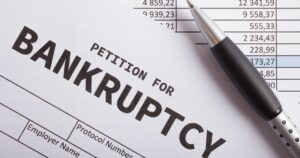What can you include in Chapter 7 Bankruptcy?
When you file for Chapter 7 bankruptcy, you can discharge numerous debts, but not every single one. Debts including child support, federal student loans, or past due taxes are excluded from this discharge. Furthermore, some assets might require liquidation before you can proceed to the debt discharge phase.
Deciding to file for Chapter 7 bankruptcy is a big decision – and not one you should do lightly. While it is a way to have a fresh financial start, it comes with costs. Furthermore, you cannot include all types of debts. Therefore, if you have too many debts in the “excluded” category, you will want to discuss different bankruptcy options with your attorney.
What “Discharge” Means in Chapter 7
The term “discharge” means that you are released from all financial obligations to a creditor, and the creditor has no right or legal standing to seek collection against you once the debt is discharged officially by the court. While you are not liable for those debts, some you might reaffirm, like your car payment or home. In this case, you will make payments on those debts, and if you do not, the creditor is allowed to repossess the vehicle or start the foreclosure process on your home.
If you file for Chapter 7, you receive your discharge at the end of your case, which can take a few months. You have multiple steps you must complete before you can officially finish your case, including taking courses, meeting with creditors, and filing the correct documents.
On average, you can expect your discharge to occur within 60 days of your 341(a) meeting, also known as the Meeting of the Creditors.
What Debts Can You Discharge in a Chapter 7 Bankruptcy?
Multiple debts might qualify for discharge, but the timing of those debts matters, too.
Debts that you incur before filing for bankruptcy may qualify for Chapter 7 discharge. The court will discharge those qualifying debts at the end of your case. Any debts you incur after you file for bankruptcy, or any debts you do not list on your petition to file, will not. That means if you incur credit card debts after filing, you will not be absolved of those debts and creditors can seek action.
Debts that you can discharge in Chapter 7 include:
- Credit Cards – Includes store and major credit card brands, overdue fees, and interest or late fees added to your entire balance.
- Collection Agencies – Any debts that have gone to third-party collection agencies are included in your bankruptcy.
- Medical Bills – Outstanding medical bills, including physician payments, hospital bills, laboratory work, and other out-of-pocket expenses not covered by your insurance and pending payment can discharge in Chapter 7.
- Personal Loans – Personal loans taken from family, friends, and employers can be discharged as long as you have documentation on the loan’s details.
- Utilities – Past due utility accounts, including television, phone, water, trash, gas, and electricity, can be discharged, but only the past due amounts. Amounts you incur after filing your petition and after that are not part of your bankruptcy, and you are required to pay those debts.
- Dishonored Checks – Checks that bounce might qualify. However, you must show you wrote those dishonored checks in good faith and that you did not write a check you knew would not clear.
- Student Loans (Maybe) – Most student loans cannot discharge, but if you can prove undue hardship, then you might qualify for discharge on your federal student loans.
- Lease Agreement Debts – Any past due amounts on lease agreements, such as past due rent or a vehicle lease, might be discharged.
- Civil Court and Other Judgments – Car accident and other civil court judgments can be discharged as long as the case was not based on fraud. If you were sued for fraudulent activities, you could not discharge that debt and you are obligated to pay it.
- Revolving Charge Accounts – Any revolving charge accounts that you own other than an extended payment charge plan.
- Others – Social Security overpayments, Veteran’s loans, attorney’s fees, business debts, and repossession balances can also be discharged.
The List of Non-Dischargeable Debts for Chapter 7 Bankruptcy
While you do have many debts that qualify for discharge, there are some that cannot be discharged. It is important you know this list because the higher your debts are in the non-dischargeable column, the more likely it is you need Chapter 13 (a restructuring/repayment plan) than Chapter 7.
Debts that do not qualify include:
- Child Support – Any past owed child support payments and existing payments required are non-dischargeable regardless of how old they are. You must pay these, even when in arrears, to stop state collection efforts.
- Alimony – Court-ordered alimony does not qualify for discharge either; therefore, you must pay all back owed and future payments.
- Taxes – Taxes, especially within the past few years, will not discharge in Chapter 7.
- Debts from Fraud, or Death and Injury from Intoxicated Driving – Any civil judgments for a death or injury claim arising from driving while under the influence cannot be discharged in Chapter 7. Likewise, any debt that is the result of fraud, including writing bounced checks or civil cases for fraud, cannot discharge.
Do You Need to File for Chapter 7 Bankruptcy? Contact a Local Bankruptcy Attorney First
If you find yourself overwhelmed with monthly debt payments and you can no longer make those payments with your existing income, you might qualify for Chapter 7 bankruptcy. Chapter 7 has strict qualification measures; therefore, you should speak with an attorney before assuming you qualify.
Our attorneys can help you with your Chapter 7 case. We will assess your existing debts and help determine if you qualify for Chapter 7. If you do, our team will begin the process, including filing the necessary paperwork and guiding you through each step that you must complete so that your case is not unnecessarily delayed.
To get started, contact us schedule a confidential consultation.

